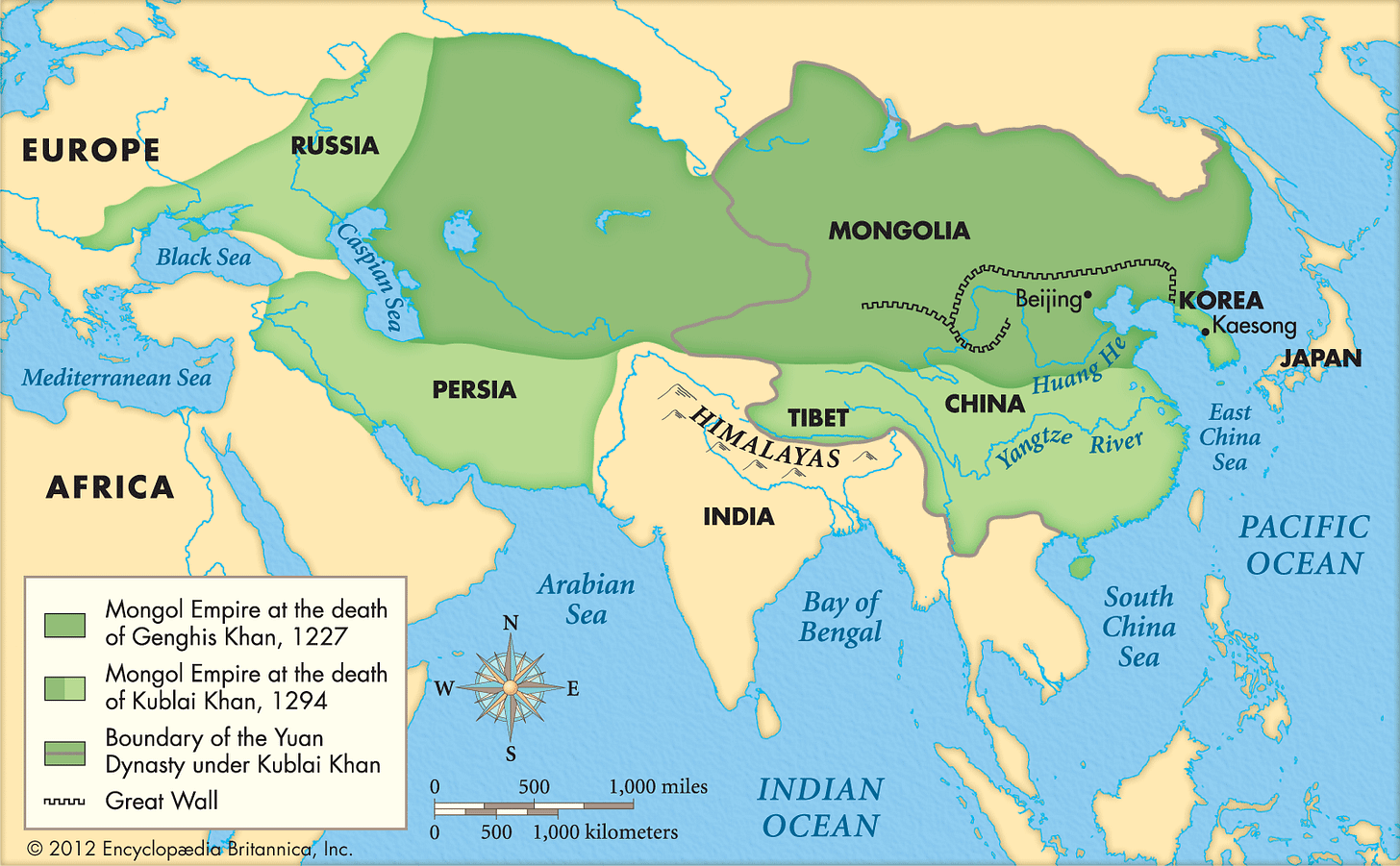friends, shannonigans today is on mr. genghis khan.
Two years ago, when I published this musing on Covid gatherings with the Daily Cal, Professor Jack Weatherford sent me an email saying he appreciated the passing mention of his book The Secret History of the Mongol Queens. In hopeful jest, but also in all seriousness, we had invited him to speak in our mini lecture series — he unfortunately was in living in an area with poor wifi service. sad.
Many stories came out of that book, not the least the game “Everyone is Khojin” hosted by Erika that summer, where each of us, in a roleplay game, enacted the will of a different “personality” of Khojin, a daughter of Genghis Khan. My Khojin preached about tea to the Great Khan, started a women’s only date-cake baking group, and completed a feminist revolution with my sisters to take over the Mongol Kingdom. Another Khojin flogged Parco Molo (yes, you read it right) with a leek (yes, you also read this right).
Okay, anyways, that’s neither here nor there. If you need a date cake recipe, I have one. It’s a cake made of dates, could also be cake for a date.
A few takeaways from my reading of Genghis Khan and the Making of the Modern World:
I am interested in how the “known” world expands and contracts. The world under the Mongol Empire was once deeply connected by trade, and that world order was broken down and dissolved by plague and increasing intolerance.
I am curious how people in history have contextualized foreign invaders. When the Mongols conquered Eastern Europe, the Christian clergy had no explanation for who the conquerers may have been and posited that the Mongols were lost Jews from the era of Moses, causing many Jewish folk in their cities to be further persecuted — as Brad says “Virgin transcultural literacy vs. Chad Anti-Seminitism” lol
I wonder how we interpret lessons and purpose from history. Voltaire wrote the Orphan of China, scapegoating Genghis Khan’s barbaric-ness as a critique of a violence-centered empire without culture (maybe as a warning to his own King, without criticizing the King directly). Later, anti-imperialists in India and Japan claimed the legacy of Genghis Khan as a counter to Western powers and a justification for unification of Asia under Pan-Mongolism. Imagine a unified Asia that derived its history from Genghis Khan.
Genghis Khan and his successors built an empire that stretched from Europe to Asia with freedom of religious expression and strong protections of merchants, peaking in 1294 around the death of his grandson, Kublai Khan. Each division of the Mongol Empire—Russia (Golden Horde), China (Yuan), Persia (Ilkhanate), and Central Asia (Chagatai Khanate)— held “shares” in the other divisions, meaning crop and goods produced in each region were sent great distances to be used and sold by the other members of the royal family. This interstate movement of goods created one of the most well-lubricated and well-protected systems of trade for all merchants across this territory. Pax Mongolica indeed.
Merchants, scholars, and missionaries moved freely between borders. There is an episode in which a Franciscan priest, compelled by the Pope, arrived at the Mongol court to preach Catholicism; he was met with skepticism from the Christian, Buddhist, and Islamic missionaries already advising the court. The Mongol rulers asked the religious leaders to resolve the conflict with an organized debate on the topics such as “what happens after death?” Between each argument, the debaters drank fermented mare’s milk, kumis. Irresolvable and irreconcilable as these topics are, the night ended with everyone so drunk that they were unable to debate further. Maybe this is how Presidential debates should go too?
This empire collapsed due to the bubonic plague, which wiped out entire towns, restricted movement of people, and severed the strong ties between the different Mongol rulers. The plague was spread through trade, carried by fleas and rats from Asia to Europe to Africa, killing between 30-60% of the population. By comparison, Covid has caused the deaths of about .3% of the US population (still incredibly alarming at about 997k people as of May 11th).
Thinking about how our modern plague threatened interstate commerce and communication, how our globalized world seems thwarted by increasing protectionist and xenophobic sentiment, how hopefully this era of women leaders (harking to the great queens of the Mongols) isn’t erased from history as the Mongol queens were from the Secret History.
There’s a narrative in Chinese history dramas (燕云台,延禧攻略,etc) where the main characters dream of living a simple and peaceful life in the countryside, and they are given a single episode of respite. Inevitably, they are called to take power by circumstances beyond their control, and they cannot escape this destiny. We then witness the development of a great ruler who sacrificed a personal dream. In some ways, Genghis Khan was like this too.
He dreamed of a simple life in the steppe with his wife Borte. However, the Merkit, a neighboring tribe, stole Borte from Temujin, and thus began the power and strength-gathering of one of the best warriors of history. In the tale told in the Secret History, Temujin sought the support of a neighboring Khan and rode into the Merkit camp, calling her name. She jumped off a moving cart and ran towards the voice, shouting his name back. They reunited, and from that moment, Temujin embarked on the journey of protecting his family and his land by consolidating and building power.
Even if this type of narrative is contrived, it holds a lot of power. There’s something about giving up simplicity for a greater purpose that makes a ruler all the more compelling.
What are you thinking about? heheh
Also ps: the next shannonigans will be about 缘, a little fate.
Okay bye!




fun read! looking forward to the next one :)